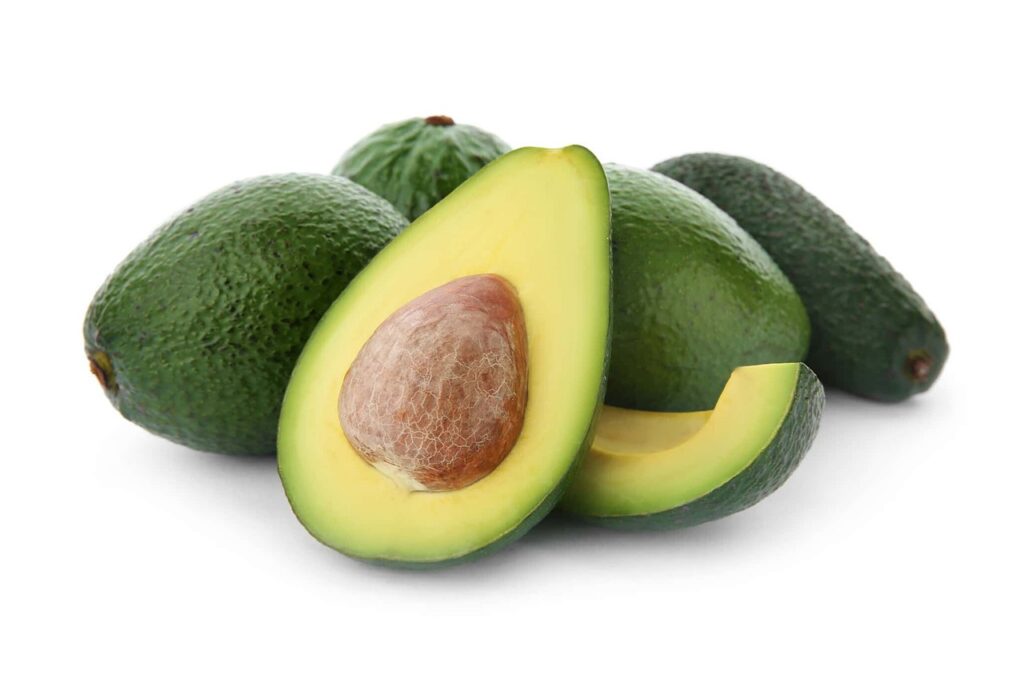Health Benefits of Avocado

Often described as a superfood, avocados are considered to be one of the best fruits for your health. This is because they contain large amounts of potassium, choline and fatty acids. These are essential nutrients which play a vital role in cardiovascular health, neurotransmission and cell metabolism. In this article we will look at the health benefits of avocado.
Nutritional Content
Avocados are a nutrient dense food which contain almost 20 vitamins and minerals. They are the only fruit which provide a substantial amount of healthy monounsaturated fatty acids. These are responsible for the majority of the health benefits of avocado.
Avocados contain the following nutrients:
| Avocado Nutrition Facts Serving Size: 1 cup (150 g) | |
|---|---|
| Calories | 240 |
| Total Fat | 22 g |
| Saturated Fat | 3.19 g |
| Trans Fat | 0 g |
| Cholesterol | 0 mg |
| Sodium | 10.5 mg |
| Total Carbohydrates | 12.8 g |
| Dietary Fibre | 10 g |
| Sugar | 0.99 g |
| Protein | 3 g |
| Vitamin A | 10.5 mcg |
| Vitamin C | 15 mg |
| Calcium | 18mg |
| Iron | 0.825 mg |
Avocados are also a great source of vitamins C, E, K, and B6 as well as riboflavin, thiamine, niacin, folate, pantothenic acid, magnesium, and potassium. They also contain lutein, beta-carotene, and omega-3 fatty acids.
Health Benefits of Avocado
The health benefits of avocado include:
1. High content of Healthy Fats
Avocados are full of healthy, beneficial fats, the majority of which is oleic acid. This is a monounsaturated fatty acid which is also the major component of olive oil. This has been linked with reduced inflammation and shown to have beneficial effects on genes linked to cancer. Monounsaturated and polyunsaturated fats are often called the ΄good fats.΄ The consumption of avocados has therefore been linked to lower levels of bad (LDL) cholesterol. Studies show that eating avocados regularly can reduce total cholesterol, triglycerides and LDL levels and also raise the ΄good΄ cholesterol (HDL). In fact, an avocado a day can reduce the bad cholesterol level in overweight and obese individuals over time.
In addition, avocados contain high levels of natural plant sterols such as beta-sitosterol. The regular consumption of beta-sitosterol and other plant sterols has been shown to help maintain healthy cholesterol levels
2. High fibre content
High fibre diets can lower blood sugar, reduce cholesterol, and potentially prevent some kinds of cancer, such as colon cancer. The recommended daily intake of fibre is 25 grams for women and 35 grams for men. One avocado contains about10 grams.
Avocados have a high fibre content which ensures that the intestines work smoothly. They contain both soluble and insoluble fibre. Soluble fibre, such as pectin, is important for maintaining healthy blood sugar and cholesterol levels. Fibre also slows the movement of food through the digestive tract which in turn nourishes the beneficial gut bacteria. This is important because a healthy bacterial gut flora is linked to a lower risk of obesity.
Eating foods high in natural fibre is vital because they can help prevent constipation, maintain a healthy digestive tract, and lower the risk of colon cancer.
3. High potassium content
Avocados contain more potassium than bananas.
Potassium is an important electrolyte because it is necessary for the maintenance of regular heart rhythm, blood pressure, neuromuscular functioning, and water balance. Sodium and potassium surround the cells as positively charged ions. These provide the electrical potential necessary for cell membranes to control the movement of water into the cells.
Potassium intake is important because studies have shown that a high potassium intake is linked to reduced blood pressure. This is a major risk factor for heart attacks, strokes and kidney failure.
4. Improved absorption of plant nutrients
The high fat content of avocados dramatically improves the absorption of fat soluble nutrients from the gastrointestinal tract. Fat soluble nutrients include vitamins A, D, E and K and antioxidants such as the carotenoids. Adding avocado to your meals will therefore ensure that the fat soluble nutrients are not lost.
5. May protect the eyes
Avocados contain high levels of powerful antioxidant carotenoid phytochemicals such as lutein and zeaxanthin. These are very important for eye health as they are absorbed in to the eye tissues. As a result, they protect the eyes by minimising damage, including that from ultraviolet light.
The monounsaturated fatty acids in avocados help increase the absorption of other beneficial fat-soluble antioxidants, such as beta-carotene. Studies show that regularly eating avocados can benefit eye health in the long term as they reduce the risk of cataracts and age-related macular degeneration.
6. May Help Prevent Cancer
Though more research is required, studies have shown that avocados may be beneficial in the prevention and treatment of cancer. This is because studies have shown that phytochemicals in avocado can selectively inhibit the growth of precancerous and cancerous cells. This causes the death of cancer cells while stimulating the proliferation of the lymphocytes in the immune system. In fact, test tube studies have shown that avocado extract inhibits the growth of prostate cancer cells.
Avocados contain high levels of folic acid. This is important because the adequate intake of folic acid has been linked to protection against colon, stomach, pancreatic, and cervical cancers. Although the mechanism of action is not known, it is thought that folate protects against undesirable mutations in DNA and RNA during cell division.
7. May Help You Lose Weight
There is evidence to suggest that avocados can help with weight loss because the combination of fat and fibre in avocados makes you feel full for longer. In fact, studies have shown that 28% of adults who added half a fresh avocado to their lunch were less likely to feel hungry after eating for the next 5 hours. Eating fat slows down the breakdown of carbohydrates, which in turn helps to keep blood sugar levels stable.
Avocados help to keep you full and satiated as they are full of healthy, beneficial fats and fibre. Regularly incorporating avocados in your diet should therefore promote weight loss over time as they are high in fibre and low in carbohydrates, .
8. Lower risk of depression
Because of their high levels of folic acid, avocados may reduce the risk of depression. This is because folic acid helps to prevent the build-up of homocysteine, an amino acid which can impair the circulation and delivery of nutrients to the brain. In addition, excess homocysteine can also interfere with the production of serotonin, dopamine, and norepinephrine. These are neurotransmitters which regulate mood, sleep, and appetite.
Summary
Avocados are one of the healthiest fruits as they are loaded with vitamins, minerals, healthy fats and various phytochemicals. They should be added regularly to your diet as avocados have several health benefits and, most important of all, taste delicious.
